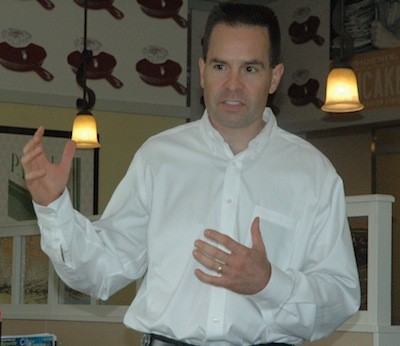LAKEWOOD — Economic development, transportation infrastructure and public safety were among the subjects covered by Marysville Mayor Jon Nehring during his coffee klatch with citizens in the International House of Pancakes restaurant in Lakewood on Tuesday, Sept. 24.
Nehring reiterated the city’s oft-stared aspirations to revitalize its southern waterfront as a mix of retail and residential, as well as to take advantage of the nearly 1,000 available acres in the city’s northern end by transforming them into a manufacturing and industrial hub. He also pledged to Lakewood residents that the city would continue its efforts to complete the 156th Street overcrossing’s transition into a full-fledged interchange, to help ease traffic congestion at 172nd Street, and again proposed providing an off-ramp from State Route 529 onto Interstate 5, in order to bypass the choke-point of Fourth Street.
City of Marysville Chief Administrative Officer Gloria Hirashima and Public Works Director Kevin Nielsen joined Nehring for his informal morning chat with the IHoP patrons, with Hirashima responding to rumors that Fred Meyer might be coming to Lakewood by explaining that the city has had no direct discussions with any potential tenants of the nearly 290,000 square feet of approved development in the area, while Nielsen reported that the city is looking to widen 169th Street and install traffic lights that would sync up with the other intersections along 27th Avenue.
Nielsen sympathized with attendees who advocated extending 27th Avenue to connect with 156th Street before any further development takes place, and lamented the standards which require the reverse to occur.
“Right now, the traffic in that area is not failing,” said Nielsen, who quickly elaborated when he was met with expressions of disbelief from those in attendance. “There are standards for traffic failure that are consistent across the nation, and while traffic is bad there right now, it doesn’t currently qualify as failing, unlike the 88th Street and Fourth Street intersections.”
“Before I got into government, I used to wonder why the city didn’t just build road improvements before increased development caused their traffic to fail,” Nehring said. “But legally, we can’t make them pay for those road improvements before they do their developments, so they don’t have to pay for improvements until the roads are already failing. Without those mitigation fees, trying to cover the costs of those road improvements ourselves would eat through our general fund revenues very quickly.”
Nielsen pointed out that Marysville has promoted its transportation infrastructure projects enough for state and even national-level legislators to take notice, even while competing with the interests of larger cities like Seattle and Tacoma.
Nehring then expanded on Hirashima’s earlier remarks by clarifying that, while the city cannot act on behalf of private property owners to fill their spaces with specific tenants, such as certain retailers, the city can indirectly serve as an agent for property owners, by doing its best to attract businesses to the area, and introducing them to property owners who have open spaces to fill, so that those businesses and private property owners can work out deals between them.
“I’m not a fan of the bikini baristas, but we cannot remove them as long as they abide by the law,” Nehring said, addressing another of the city’s limits in dealing with businesses. “We do have our police keeping an eye on them, and we have asked them to tone it down, but they communicated to us that we could take a take,” he laughed. “They are Constitutionally protected, and while we can request that they voluntarily make themselves more amenable to the community, they’ve declined, so we have no real enforcement power over that.”
When asked about the financial state of the city, Nehring deemed it as being “in the best shape that I can remember,” since he recalled that not even the economic “boom times” prior to the recession boasted the city’s current reserve fund level of 24 percent, but he emphasized that there remains very little discretionary revenue in the city’s budget, most of which is dedicated to funding specific needs and services.
“We’re not flush, but we’re financially healthy,” Nehring said. “Still, we need to pretend that money is not there, because we need to replenish our funds and take care of basic maintenance before we deal with other problems.”
In addition to making up for not doing any street overlays between 2010-12, Nehring would like to start a capital reserve fund, to avoid seeing the city’s debt stack up again.
Although Hirashima informed Lakewood residents that the city has considered a Marysville Police Department annex in their area, possibly by teaming up with the Marysville Fire District to share space at their fire station in north Marysville, Nehring added that Marysville Police regularly patrol the Lakewood area.
“What concerns me, throughout the city, is the number of burglaries, which I see as being tied into the drug problem,” said Nehring, who echoed Arlington Police Chief Nelson Beazley in likewise attributing the amount of panhandling in the area to the drug trade. “In addition to locking your doors, and the city trying to beef up its force on the street, we also have the Marysville Volunteer Program, whose members patrol the schools and businesses, and will check up on your home when you’re away, if you contact them.”
Since Nehring tries to conduct his coffee klatches quarterly throughout the Marysville area, he anticipated his next such chat with Lakewood residents would be in about nine months.
“Marysville has one of the lowest employees-to-citizens ratio of any city government in the county, with only 5.5 city employees per 1,000 citizens,” Nehring said. “Government employees are not always looked on well, because of a few bad apples, but city governments like ours tend to be more bipartisan, because we just don’t have the time for the big fights that they get into in Washington, D.C. Local government is closest to the people, and the most accountable to them.”



